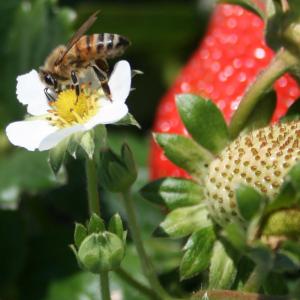Planting more than one crop with strawberries can benefit quality and bees
When farmers increase the number of crops in their fields, this in turn changes the landscape, and wild pollinators stand to benefit, according to a paper published yesterday in Frontiers and authored by The Organic Center’s director, Dr. Amber Sciligo, PhD.
Few studies until now have looked at how diverse cropping on farms can create semi-natural habitat that benefit native pollinators and improve the quality of crops. Some science shows that organic farms support more diversity and abundance of insects from the elimination of synthetic agrochemicals that can impact pollinators.
Sciligo and other scientists from the study wanted to know if growing multiple crops on organic farms would have a positive impact on native bees and in turn on the quality of the crops. To do this, Sciligo looked at 16 organic strawberry farms in Santa Cruz and Monterey Counties on California’s Central Coast: those planted with only strawberry (monocultures) and those planted with strawberry in addition to at least five other crops (polycultures); and compared the types of natural habitat surrounding monoculture and polyculture strawberry farms.
On the farms, they netted bees and collected samples of strawberries, and what they found offered some surprising and perhaps less surprising takeaways: When farmers plant more than one crop (polyculture), both the number of species and overall pollinators increase.
But when monoculture strawberry farms have some supporting surrounding natural habitat (most often planted windbreaks and floral strips), this enhances the diversity of native bees further, and this increase in diversity leads to more shapely and marketable berries by ensuring better pollination of strawberry flowers. These results are seen in the study’s resulting strawberries collected from pollinator exclusion experiments on the organic farms.
And while strawberries grown in North America are typically thought of as a wind-pollinated crop, there is prior evidence that the visits from native bees to the flowers of strawberries can yield higher quality fruit with less misshapen strawberries. Previous studies show that honeybees tend to visit only the top of the strawberry flower receptacle, while native bees often crawl around the flower base, leading to more complete pollination and better formed berries.
Pollination of crops is often managed through augmenting hives of domesticated European honeybees. Possible competition with native bees from honeybees visiting strawberries from nearby caneberry farms supplemented with hives could explain why more visits from honeybees in the study is correlated with more misshapen strawberries.
These findings reveal that polycultures can mimic semi-natural habitat and support more abundant and diverse pollinator communities and highlight the benefits of diversifying crops within organic. “What’s really exciting about these results is that we can see clear improvements in biodiversity by modifying plant diversity on the farm," says Dr. Sciligo. "This can potentially substitute the benefits of landscape diversity and gives the farmer some control over managing ecosystem services to their crops.”
One of the most effective ways to build robust pollinator communities is to increase the diversity of the vegetation in the landscape and on the farms. Practices that increase on-farm diversity like polyculture, cover cropping, and hedgerows can often improve ecosystem function with neutral or positive effects on crop yields.
Previous studies show that polycultures improve soil health and natural pest control, while hedgerows around fields and natural habitat patches in the surrounding landscape can enhance natural predator and pollinator communities. “Using practices that add on-farm diversity can benefit biodiversity in all farm settings, not just those that are certified organic,” says Sciligo.
The study’s authors also point out that farming multiple crops within the context of one agricultural farm or field can open up complexity and other challenges for farmers.
Learn more about the science and benefits of organic farming through The Organic Center’s recipes: https://www.organic-center.org/recipes/dutch-oven-pancakes-fresh-strawberries.



